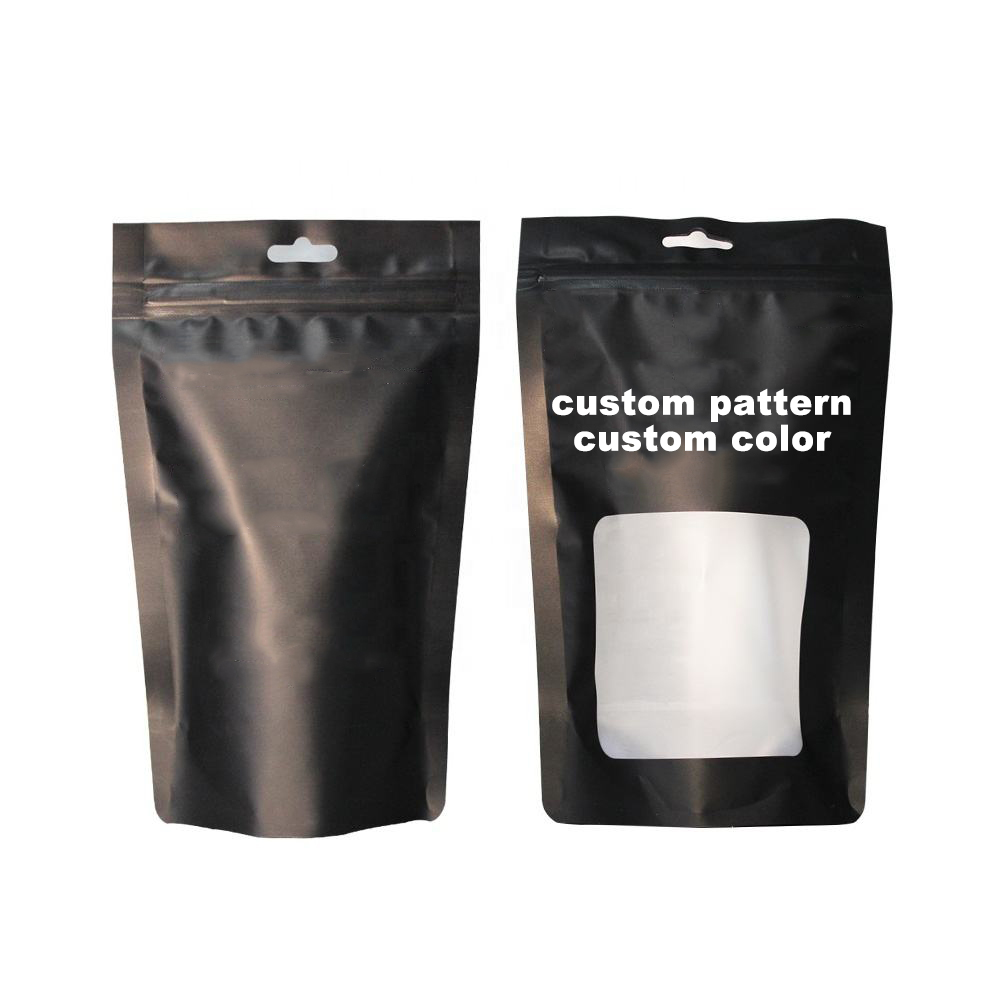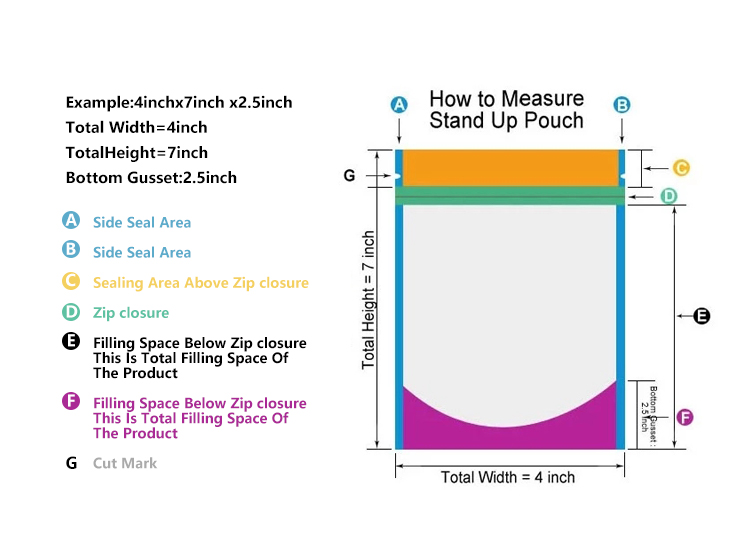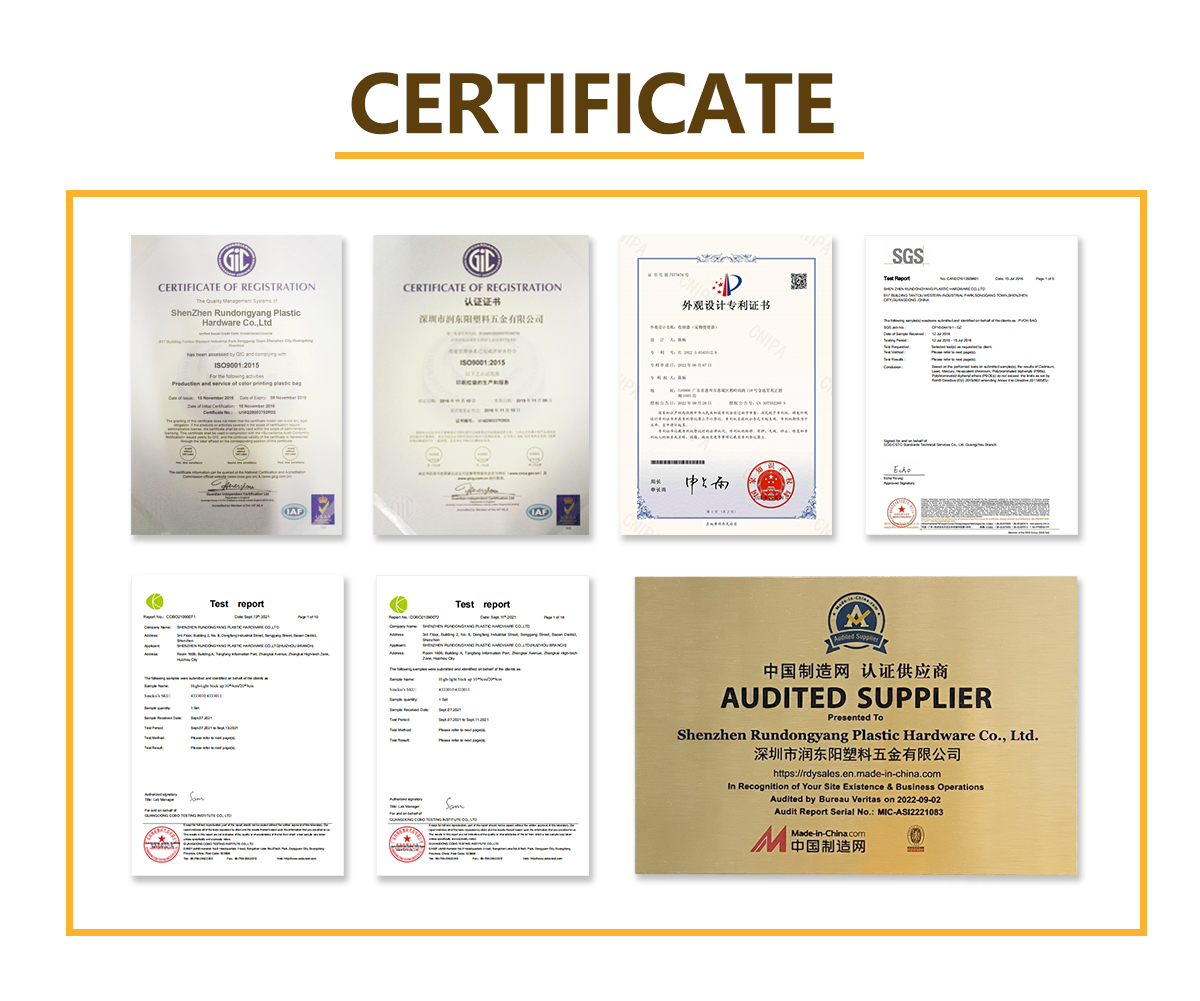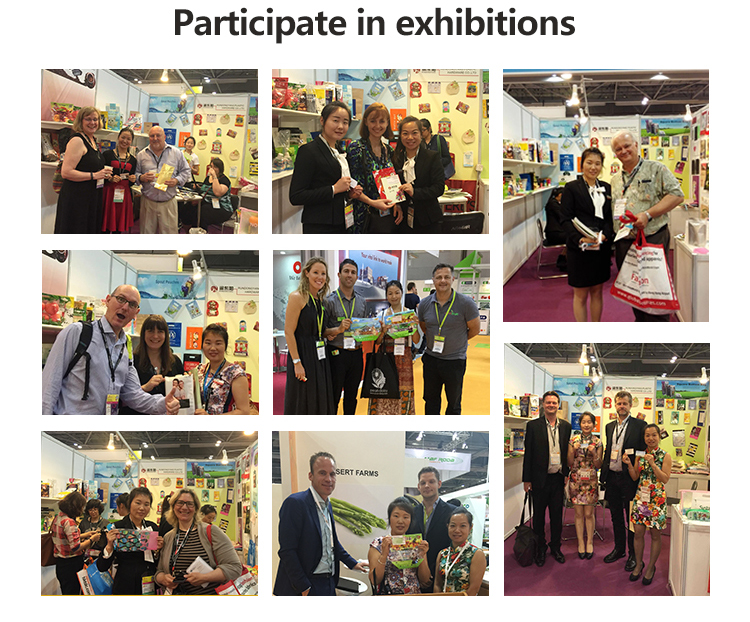Custom packaging bags are designed and manufactured according to the specific requirements and preferences of customers. They are used for a wide range of products, including food, electronics, clothing, and gifts, among others. These bags can be customized in terms of size, shape, material, color, and branding elements to create a unique and personalized packaging solution. Custom packaging bags not only serve the purpose of protecting and containing products but also help in promoting a brand's identity and enhancing the overall presentation of the product. They are an essential component of effective marketing and can contribute to a positive customer experience.
1.Paper: Paper is a versatile and eco-friendly material widely used for custom packaging bags. It is available in various thicknesses and finishes. Paper bags are lightweight, recyclable, printable, and customizable. They offer good branding opportunities and are suitable for a wide range of products.
2.Plastic: Plastic packaging bags are popular due to their durability and flexibility. Different types of plastics are used, such as polyethylene (PE), polypropylene (PP), and biodegradable plastics. Plastic bags can be transparent or opaque, and they provide excellent barrier properties for various products.
3.Biodegradable Materials: Biodegradable materials are designed to break down naturally over time, reducing their impact on the environment. They are often made from plant-based sources. Biodegradable packaging bags offer an eco-friendly alternative to traditional plastics. They can be compostable, reducing waste and promoting sustainability.
4.Non-Woven Fabric: Non-woven fabric is a synthetic material made by bonding fibers together. It is commonly used for custom tote bags and promotional packaging. Non-woven fabric bags are lightweight, durable, customizable through printing, and reusable. They provide a soft texture and are popular for their versatility.
| Material | Characteristics |
|---|---|
| Paper | Lightweight, recyclable, printable, customizable |
| Plastic | Durable, flexible, transparent, barrier properties |
| Biodegradable | Eco-friendly, compostable, reduces environmental impact |
| Non-Woven Fabric | Lightweight, durable, customizable, reusable |

1.Custom Tote Bags: Tote bags are a popular choice for custom packaging bags. They are versatile, reusable, and customizable to fit different branding needs. Custom tote bags are commonly used for promotional giveaways, events, and retail packaging.
2.Custom Shopping Bags: Custom shopping bags are designed for carrying purchased items. These bags can be made of paper, plastic, or reusable materials and are often customized with logos, slogans, or branding elements. They provide a convenient and eco-friendly packaging solution.
3.Custom Gift Bags: Custom gift bags are specially designed for packaging gifts. They come in various sizes, shapes, and materials, such as paper, fabric, or organza. Custom gift bags are often personalized with unique designs, custom messages, or company branding.
4.Custom Food Packaging Bags: Custom food packaging bags are specifically tailored for packaging food products. They ensure food safety, freshness, and convenience. Examples include custom printed stand-up pouches, resealable bags, or custom printed food-grade plastic bags.
5.Custom Ziplock Bags: Ziplock bags are versatile and widely used for storing and packaging various items. Custom ziplock bags can be printed with branding, product information, or instructions. They are commonly used for retail packaging, organizing small items, or sample distribution.
6.Custom Courier Bags: Custom courier bags, also known as mailing bags or poly mailers, are designed for shipping and mailing purposes. These bags are made of durable materials, often plastic, and can be customized with printed shipping labels, branding, or instructions.
7.Custom Stand-up Pouches: Stand-up pouches are popular for packaging a wide range of products, such as snacks, powders, or liquids. Custom stand-up pouches provide ample space for branding, product information, and attractive designs.
8.Custom Vacuum Bags: Vacuum bags are used for packaging and storing items while removing air to preserve freshness or reduce space. Custom vacuum bags can be printed with branding, instructions, or product details.
9.Custom Eco-friendly Bags: Custom eco-friendly bags are designed with sustainability in mind. They are made from recycled materials, biodegradable plastics, or organic fabrics. Custom eco-friendly bags showcase a brand's commitment to the environment.
These are just some examples of the types of custom packaging bags available. The choice of bag depends on the specific product, packaging requirements, and branding objectives.

When it comes to custom packaging bags design ideas, there are numerous creative possibilities to consider. Here are six design ideas that you may find interesting:
1.Minimalist Elegance: Opt for a clean and minimalistic design, using a simple color palette and subtle branding elements. This style exudes sophistication and can make your packaging bags stand out.
2.Bold and Vibrant: Experiment with vibrant colors, bold patterns, and eye-catching graphics to create packaging bags that capture attention and leave a lasting impression.
3.Nature-Inspired: Incorporate natural elements such as botanical prints, organic textures, or earthy tones to convey an eco-friendly or sustainable image for your brand.
4.Custom Illustrations: Commission custom illustrations that align with your brand's identity and values. These unique designs can add a touch of personality and charm to your packaging bags.
5.Typography Focus: Make typography the centerpiece of your packaging bags by using striking fonts, interesting lettering styles, or innovative typographic layouts. This approach can create a strong visual impact.
6.Interactive Elements: Consider adding interactive features to your packaging bags, such as QR codes, hidden messages, or puzzles, to engage customers and create a memorable unboxing experience.

Eco-friendly custom packaging bags have gained significant popularity as businesses and consumers increasingly prioritize sustainability and environmental responsibility. Here are some key ideas and features to consider when designing eco-friendly custom packaging bags:
1.Biodegradable Materials: Choose materials that are biodegradable or compostable, such as plant-based plastics (bioplastics), paper, or organic fabrics. These materials break down naturally over time, reducing their impact on the environment.
2.Recycled Materials: Opt for packaging bags made from recycled materials, such as recycled paper or plastic. Using recycled materials helps reduce the demand for virgin resources and minimizes waste.
3.Minimalistic Design: Embrace a minimalistic design approach that reduces the use of excessive packaging materials. Keep the design simple and focus on essential branding elements to minimize waste.
4.Sustainable Inks and Printing: Utilize environmentally friendly inks made from natural or vegetable-based sources for printing on the packaging bags. This reduces the release of harmful chemicals during the printing process.
5.Reusable and Multi-purpose: Design packaging bags that can be reused by customers for other purposes, such as shopping or storage. This extends the lifespan of the bags and reduces the need for single-use alternatives.
6.Clear Recycling Instructions: Provide clear instructions on the packaging bags about how to properly dispose of and recycle them. This helps educate customers and encourages responsible waste management.
7.Sustainable Supply Chain: Ensure that the entire supply chain involved in producing the packaging bags follows sustainable practices. This includes sourcing materials responsibly, minimizing energy consumption, and reducing emissions.
By incorporating these eco-friendly elements into your custom packaging bags, you can demonstrate your commitment to environmental sustainability and appeal to environmentally conscious customers.

When it comes to custom packaging bag printing options, there are various techniques and choices available to create a unique and visually appealing design. Here are some common printing options to consider:
1.Flexographic Printing: Flexographic printing is a popular and cost-effective option for custom packaging bags. It involves using flexible rubber plates to transfer ink onto the bags. Flexographic printing works well for simple designs and solid colors.
2.Offset Printing: Offset printing offers high-quality results and is suitable for complex designs, fine details, and a wide range of colors. It involves transferring ink from a metal plate to a rubber blanket before applying it to the packaging bags.
3.Digital Printing: Digital printing is a versatile option that allows for quick turnaround times and the ability to print variable data or designs. It is well-suited for short print runs and offers excellent color reproduction.
4.Screen Printing: Screen printing involves using a mesh screen to transfer ink onto the packaging bags. It is ideal for bold and vibrant designs and can produce opaque colors and specialty inks like metallic or fluorescent.
5.Foil Stamping: Foil stamping adds a metallic or glossy finish to specific areas of the packaging bags. It can create an elegant and luxurious appearance, making it a popular choice for high-end products.
6.Embossing or Debossing: Embossing raises specific areas of the packaging bags, creating a three-dimensional effect, while debossing depresses those areas. These techniques add texture and enhance the visual appeal of the design.
7.Spot UV Coating: Spot UV coating involves applying a glossy and raised layer to specific areas of the packaging bags. It creates a contrast between matte and glossy surfaces, adding a premium touch to the design.
Custom packaging bags can offer more than just a practical solution for containing and protecting products. They can also serve as a creative and versatile tool for marketing and branding. Here are some creative uses of custom packaging bags:
1.Branding and Logo Promotion: Use custom packaging bags as a canvas to prominently display your brand logo, tagline, or other branding elements. This helps reinforce brand recognition and creates a cohesive brand experience for customers.
2.Limited Edition or Seasonal Designs: Create special edition packaging bags for holidays, special events, or limited-time promotions. These unique designs can generate excitement and encourage customers to make a purchase.
3.Gift with Purchase: Offer custom packaging bags as a free gift with a purchase. This not only adds value to the customer's shopping experience but also promotes your brand when customers use the bags in their daily lives.
4.Artistic and Illustrative Designs: Collaborate with artists or illustrators to create custom designs that showcase creativity and uniqueness. These visually appealing bags can become collectibles or conversation starters.
5.Interactive Packaging: Incorporate interactive elements into the packaging bags to engage customers. This can include hidden messages, puzzles, or QR codes that lead to exclusive content or promotions.
6.Sustainable Messaging: Utilize custom packaging bags as a platform to communicate your commitment to sustainability and eco-friendly practices. Print messages or facts about environmental conservation to raise awareness and educate customers.
7.Social Media Promotion: Encourage customers to share photos of your custom packaging bags on social media platforms. Consider adding hashtags or social media handles on the bags to facilitate user-generated content and online brand promotion.
8.Product Information and Instructions: Print product-related information, care instructions, or usage tips on the packaging bags. This can provide added value to customers and enhance their overall experience with your product.
Custom packaging bags for retail businesses
When selecting the right custom packaging bags for your specific needs, there are several factors to consider. Here are some tips to help you make an informed decision:
1.Understand Your Product: Consider the size, shape, and nature of your product. Ensure that the packaging bags you choose can accommodate and protect your items effectively. Factor in any specific requirements such as temperature sensitivity or fragility.
2.Material Selection: Choose materials that align with your brand image and the environmental impact you wish to make. Consider options such as paper, biodegradable plastics, or recycled materials. Ensure that the chosen material is durable enough to withstand the demands of shipping and handling.
3.Customization Options: Evaluate the customization capabilities offered by the packaging supplier. Can they print your logo, branding elements, and product information on the bags? Assess the quality of printing options and ensure they align with your desired aesthetics.
4.Consider Functional Features: Think about additional functional features that may be required for your products. This could include resealable closures, handles for easy carrying, or protective padding for delicate items. Assess if the packaging bags can fulfill any specific needs of your products or customers.
5.Quantity and Budget: Determine the quantity of packaging bags you will need and establish a budget. Bulk orders often provide cost savings, but ensure the supplier can accommodate your desired quantity within your budget constraints.
6.Sustainability and Environmental Considerations: If eco-friendliness is a priority for your brand, choose packaging bags made from sustainable materials and produced using environmentally responsible practices. Look for certifications or eco-labels to verify the sustainability claims of the packaging.
7.Supplier Reliability and Reputation: Research and select a reputable packaging supplier with a track record of delivering quality products. Read reviews, request samples, and consider their customer service and delivery capabilities.
8.Test and Evaluate: Before committing to a large order, request samples and test the packaging bags with your products. Assess their functionality, durability, and overall suitability. This will help you ensure that the chosen packaging bags meet your requirements.
By considering these tips, you can select custom packaging bags that not only fulfill your practical needs but also align with your brand identity, sustainability goals, and budget constraints.